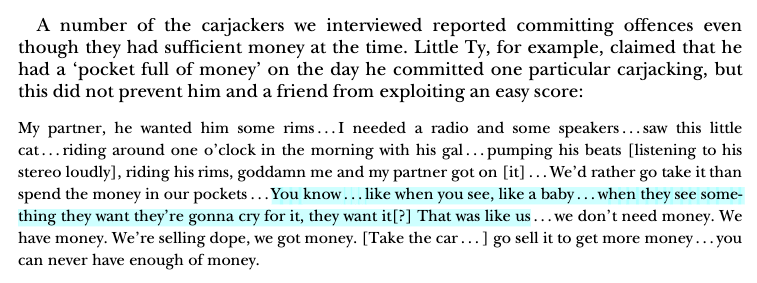Progressives: "Criminals steal because they lack opportunity, because they have no choice"
Criminal: "Actually I am dumb and impulsive like baby"

Criminal: "Actually I am dumb and impulsive like baby"
https://twitter.com/PatrickFIanagan/status/1745850252098261073

Progressives: "Criminals steal because they cannot get honest work"
Criminal: "I ain't working no fucking job. Ain't nobody got time for that."
Criminal: "I ain't working no fucking job. Ain't nobody got time for that."

Progressives: "Criminals steal because they have nothing. It's that simple. They don't have the money and they need it."
Criminals: "How much money I'm holding has nothing to do with it."
Criminals: "How much money I'm holding has nothing to do with it."

Progressives: "Criminals are behaving rationally given their economic circumstances"
Criminals: "It literally couldn't be less planned out or more impulsive."
Criminals: "It literally couldn't be less planned out or more impulsive."

Progressives: "If criminals had more resources they would not commit crimes"
Criminals: "My desire for easy money is limitless"
Criminals: "My desire for easy money is limitless"

Progressives: "You can't blame criminality on the choices of the offenders. They are put in a situation where they have no choice."
Criminals: "Our stupid bullshit is always putting us in positions where we commit even more crimes."
Criminals: "Our stupid bullshit is always putting us in positions where we commit even more crimes."

Progressives: "Criminals are motivated by need and privation."
Criminals: "We are motivated by petty resentment."
Criminals: "We are motivated by petty resentment."

Progressives: "Criminals are no different form you and me. They steal because they have to."
Criminals: "It's a rush thing. It's a thrill. I don't know, it's just in me to do this stuff."
Criminals: "It's a rush thing. It's a thrill. I don't know, it's just in me to do this stuff."

Progressives: "Criminals are forced by circumstances into a life of crime."
Criminals: "Hurting people is hilarious."
Criminals: "Hurting people is hilarious."

You should read the paper. It's short, but it says more about criminals behavior than a million progressive treatises on crime.
• • •
Missing some Tweet in this thread? You can try to
force a refresh





